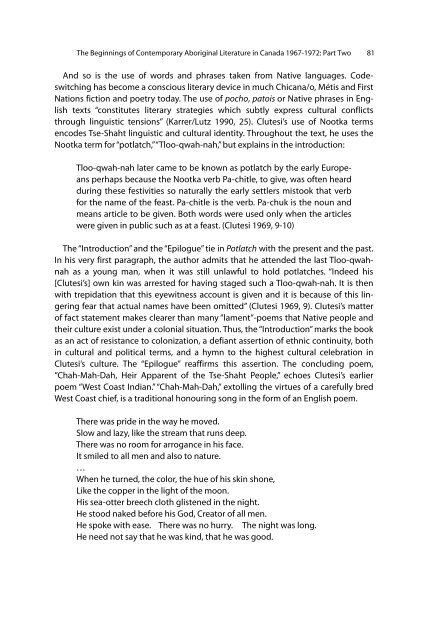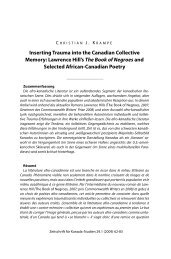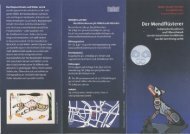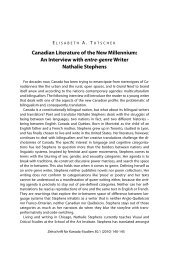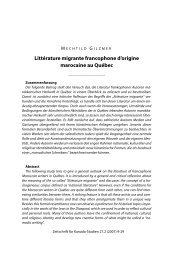The Beginnings of Contemporary Aboriginal Literature in Canada ...
The Beginnings of Contemporary Aboriginal Literature in Canada ...
The Beginnings of Contemporary Aboriginal Literature in Canada ...
You also want an ePaper? Increase the reach of your titles
YUMPU automatically turns print PDFs into web optimized ePapers that Google loves.
<strong>The</strong> <strong>Beg<strong>in</strong>n<strong>in</strong>gs</strong> <strong>of</strong> <strong>Contemporary</strong> <strong>Aborig<strong>in</strong>al</strong> <strong>Literature</strong> <strong>in</strong> <strong>Canada</strong> 1967-1972: Part Two 81<br />
And so is the use <strong>of</strong> words and phrases taken from Native languages. Codeswitch<strong>in</strong>g<br />
has become a conscious literary device <strong>in</strong> much Chicana/o, Métis and First<br />
Nations fiction and poetry today. <strong>The</strong> use <strong>of</strong> pocho, patois or Native phrases <strong>in</strong> English<br />
texts “constitutes literary strategies which subtly express cultural conflicts<br />
through l<strong>in</strong>guistic tensions” (Karrer/Lutz 1990, 25). Clutesi’s use <strong>of</strong> Nootka terms<br />
encodes Tse-Shaht l<strong>in</strong>guistic and cultural identity. Throughout the text, he uses the<br />
Nootka term for “potlatch,” “Tloo-qwah-nah,” but expla<strong>in</strong>s <strong>in</strong> the <strong>in</strong>troduction:<br />
Tloo-qwah-nah later came to be known as potlatch by the early Europeans<br />
perhaps because the Nootka verb Pa-chitle, to give, was <strong>of</strong>ten heard<br />
dur<strong>in</strong>g these festivities so naturally the early settlers mistook that verb<br />
for the name <strong>of</strong> the feast. Pa-chitle is the verb. Pa-chuk is the noun and<br />
means article to be given. Both words were used only when the articles<br />
were given <strong>in</strong> public such as at a feast. (Clutesi 1969, 9-10)<br />
<strong>The</strong> “Introduction” and the “Epilogue” tie <strong>in</strong> Potlatch with the present and the past.<br />
In his very first paragraph, the author admits that he attended the last Tloo-qwahnah<br />
as a young man, when it was still unlawful to hold potlatches. “Indeed his<br />
[Clutesi’s] own k<strong>in</strong> was arrested for hav<strong>in</strong>g staged such a Tloo-qwah-nah. It is then<br />
with trepidation that this eyewitness account is given and it is because <strong>of</strong> this l<strong>in</strong>ger<strong>in</strong>g<br />
fear that actual names have been omitted” (Clutesi 1969, 9). Clutesi’s matter<br />
<strong>of</strong> fact statement makes clearer than many “lament”-poems that Native people and<br />
their culture exist under a colonial situation. Thus, the “Introduction” marks the book<br />
as an act <strong>of</strong> resistance to colonization, a defiant assertion <strong>of</strong> ethnic cont<strong>in</strong>uity, both<br />
<strong>in</strong> cultural and political terms, and a hymn to the highest cultural celebration <strong>in</strong><br />
Clutesi’s culture. <strong>The</strong> “Epilogue” reaffirms this assertion. <strong>The</strong> conclud<strong>in</strong>g poem,<br />
“Chah-Mah-Dah, Heir Apparent <strong>of</strong> the Tse-Shaht People,” echoes Clutesi’s earlier<br />
poem “West Coast Indian.” “Chah-Mah-Dah,” extoll<strong>in</strong>g the virtues <strong>of</strong> a carefully bred<br />
West Coast chief, is a traditional honour<strong>in</strong>g song <strong>in</strong> the form <strong>of</strong> an English poem.<br />
<strong>The</strong>re was pride <strong>in</strong> the way he moved.<br />
Slow and lazy, like the stream that runs deep.<br />
<strong>The</strong>re was no room for arrogance <strong>in</strong> his face.<br />
It smiled to all men and also to nature.<br />
…<br />
When he turned, the color, the hue <strong>of</strong> his sk<strong>in</strong> shone,<br />
Like the copper <strong>in</strong> the light <strong>of</strong> the moon.<br />
His sea-otter breech cloth glistened <strong>in</strong> the night.<br />
He stood naked before his God, Creator <strong>of</strong> all men.<br />
He spoke with ease. <strong>The</strong>re was no hurry. <strong>The</strong> night was long.<br />
He need not say that he was k<strong>in</strong>d, that he was good.


